Markets
When designing a humanitarian intervention and deciding whether to use CVA, a market analysis should be part of the overall response analysis. Supporting markets to function well has been shown to lead to faster recovery and increased resilience in disaster affected areas.
Many organizations have invested in the development of tools to support market analysis and are considering market-based programming more holistically. This includes interventions that use the market (such as cash transfers to affected populations), as well as interventions that directly support markets (such as conditional grants to traders to get their market back up and running).
Related initiatives
Featured content

Introduction to Market Analysis
Course
This 30 minute online course provides an introduction to the analysis of markets in emergency contexts, with input from some of the world’s leading thinkers on the topic.

A Practical Guide to Market Analysis in Humanitarian response
Course
A three to four hour online course designed to provide future humanitarian market assessment team members with a solid understanding of theory and steps of market assessments so that they can join assessment teams prepared with a basic understanding of what they will be doing and why.
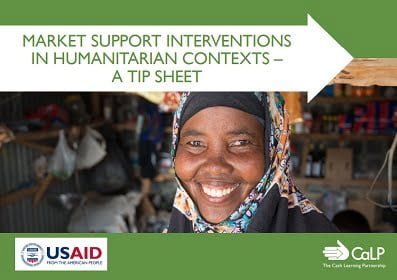
Market Support Interventions in Humanitarian Contexts – a Tip Sheet
Guidelines and Tools
This tip sheet defines what market support programming in humanitarian contexts is, and what it can look like in practice. It enables humanitarian practitioners to systematically consider market support interventions alongside other programme activities. The scope includes support interventions focusing on supply/availability and on demand/access. The tip sheet is based on secondary data...

Market Based Programming (MBP)
Guidelines and Tools
Market Based Programming (MBP) in Oxfam’s work means we always consider existing markets – through assessments, analysis and programming – across all phases of a response and across all technical sectors. You can also watch the videos below which are available in English, Spanish, Arabic and French.
Thematic lead
Latest

Evidence-Building for Cash and Markets for WASH in Emergencies: Practices in market-based programming in the hygiene subsector
Report
This report presents an overview of practices related to the use of market support and cash and voucher assistance (CVA) modalities for hygiene in humanitarian crises. These market-based approaches can have a number of advantages, such as improving the efficiency and effectiveness of emergency hygiene...
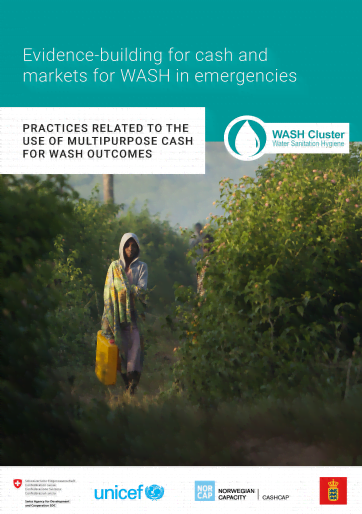
Evidence-building for Cash and Markets for WASH in Emergencies: Practices related to the use of multipurpose cash for WASH outcomes
Report
This report aims specifically to: present current practices (and practice gaps) of the use of MPC for WASH outcomes in emergencies, identifying the contexts and conditions under which MPC is used and highlighting lessons learned in contexts where humanitarian actors use MPC as a tool to meet basic needs,...

It’s Planning Season Again – What CVA actors need to know about changes to the Humanitarian Programme Cycle
Blog Post
This time last year we wrote a planning season call to arms, urging Cash Working Groups (CWGs) and Clusters to work together for better inclusion of cash and voucher assistance (CVA) in the Humanitarian Response Plans (HRP). Well planning season has rolled around again, this time with some significant...

Guidance on Market Based Programming for Humanitarian WASH Practitioners
Guidelines and Tools
The purpose of this document is to provide practical guidance in preparedness, assessment, program design, implementation and monitoring related to Market-Based Programming (MBP) in humanitarian WASH assistance, and more specifically on: How to identify linkages between markets and WASH services &...

A New Blueprint for the Future of Financial Assistance
Blog Post
Ahead of our workshop on the Future of Financial Assistance in Amman on 24 and 25 July, Paula Gil Baizan, independent expert and a member of the steering committee for the CALP Network’s Future of Financial Assistance work, encourages us to re-imagine the blueprint upon which we build the future of...
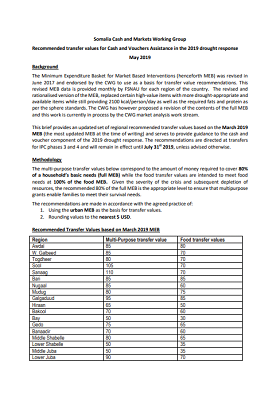
Recommended transfer values for Cash and Vouchers Assistance in the 2019 drought response
Report
This brief provides an updated set of regional recommended transfer values based on the March 2019 MEB (the most updated MEB at the time of writing) and serves to provide guidance to the cash and voucher component of the 2019 drought response. The recommendations are directed at transfers for IPC phases 3...

End-line Survey Report: Cash transfers for rapid livelihoods recovery of volcano-displaced families in Vanuatu
Report
This report documents and analyses the results of an end-line survey of the cash transfer programme (CTP), “Cash Transfers for Rapid Livelihoods Recovery of Volcano-displaced Families in Vanuatu” in Sanma province between October 2018 and March 2019. The programme was implemented by Oxfam in Vanuatu...

Market Assessment in Bandua, Inanjou and Buzi
Report
This report presents the outcome of an assessment in three markets following the impact of cyclone Idai. The overall objectives of the market assessment were to understand the functionality of the markets at the current stage and its ability to cater to the increased multi-sectoral needs if vouchers are...

Cash Enthusiast’s Guide to Humanitarian Networks and Partnerships Week
Blog Post
The fifth Humanitarian Networks and Partnerships Week (HNPW) will be held at the International Conference Centre (CICG) in Geneva, Switzerland from 4-8 February 2019.

Feasibility Study on Cash Transfer Programming for the Returnees and the Host Communities in Gedeo and West Guji in Ethiopia
Report
This document reveals the outcome of a feasibility study on cash transfer programming targeted for the returnees and the host communities in Gedeo and West Guji Zones.
The major objectives of the study were as follows:
1. Understand general cash transfer environment in Ethiopia
2. Validate the needs of...
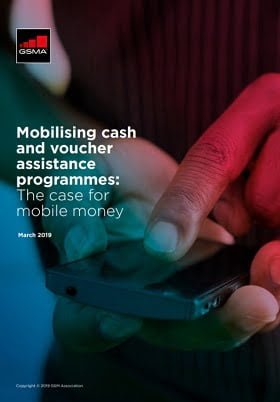
Mobilising cash and voucher assistance programmes: The case for mobile money
Guidelines and Tools
This report offers recommendations for both humanitarian organisations and mobile money service providers regarding the partnerships required to enable effective and efficient use of mobile money in humanitarian contexts.
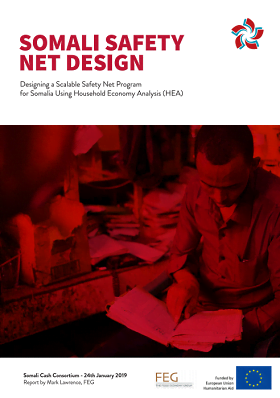
Somali Safety Net Design: Designing a Scalable Safety Net Program for Somalia Using Household Economy Analysis (HEA)
Report
The aim of the study was to use existing household economy analysis (HEA) data to help in the design of a scalable cash-transfer-based safety net program for Somalia. The study made use of a recently completed 15-year (30-season) time series analysis covering 13 livelihood zones in Somalia.

Rapid Assessment of Markets: World Vision Ecuador
Case Study
Information was collected in 7 cities which were selected because they have the highest Venezuelan population, and there are no other NGOs collecting similar information. Population surveyed corresponds to the Venezuelan population, complemented with interviews conducted in markets and houses where the...
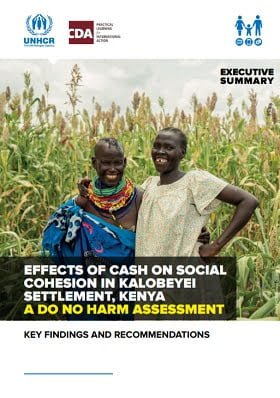
Effects of Cash on Social Cohesion in Kalobeyei Settlement, Kenya – A Do No Harm Assessment – Executive Summary
Report
The document outlines key findings on the effects of cash on social cohesion between refugee and host communities, and some considerations when planning cash assistance. The research was carried out by CDA Collaborative Learning Projects, founder of the Do No Harm Framework. UNHCR’s cash for shelter...
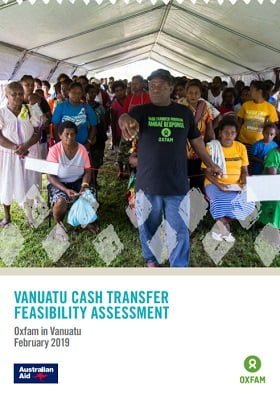
Vanuatu Cash Transfer Feasibility Assessment
Report
Oxfam conducted this Vanuatu Cash Transfer Feasibility Assessment in partnership with Youth Challenge Vanuatu, Department of Agriculture & Rural Development, and the Vanuatu National Statistics Office with funding from the Australian Department of Foreign Affairs and Trade (DFAT) through the Australian...

Vanuatu Cash Transfer Feasibility Assessment – Report summary
Report
This is a summary of the findings of the Vanuatu Cash Transfer Program (CTP) Feasibility Assessment that was conducted to build a context-specific evidence base to guide preparedness initiatives related to the use of cash and vouchers as a means of humanitarian assistance for response, recovery and...

Introductory Research on the Feasibility of Cash and Voucher Assistance in Rural Fiji
Report
This report presents the findings of a study into the general feasibility of using Cash and Voucher Assistance (CVA) in responding to disasters in Fiji. The term “Cash and Voucher Assistance” or CVA, is used in the report in line with the the CALP Network definition, so it refers to programs where...

Cash for Shelter in Kenya – A Field Experience
Report
A study of a cash for shelter project in Kalobeyei that highlights how UNHCR uses cash assistance to help the refugees to transition to more durable solutions, in this case, integration with the host community. The project presents a paradigm shift from the traditional refugee camp planning process.

Standards on Cash and Markets: Time to raise the bar
Blog Post
Humanitarian action is changing fast, and an updated set of shared standards will be crucial in upholding quality among a new generation of responders. The launch of the new Sphere Handbook on November 6th represents the most comprehensive effort to date review the humanitarian standards, to keep...
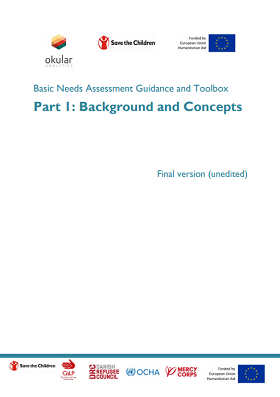
Basic Needs Assessment Guidance and Toolbox Part 1: Background and Concepts
Guidelines and Tools
This document covers humanitarian aid activities implemented with the financial assistance of the European Union. The view expressed herein should not be taken, in any way, to reflect the official opinion of the European Union and the European Commission is not responsible for any use that may be made of...



